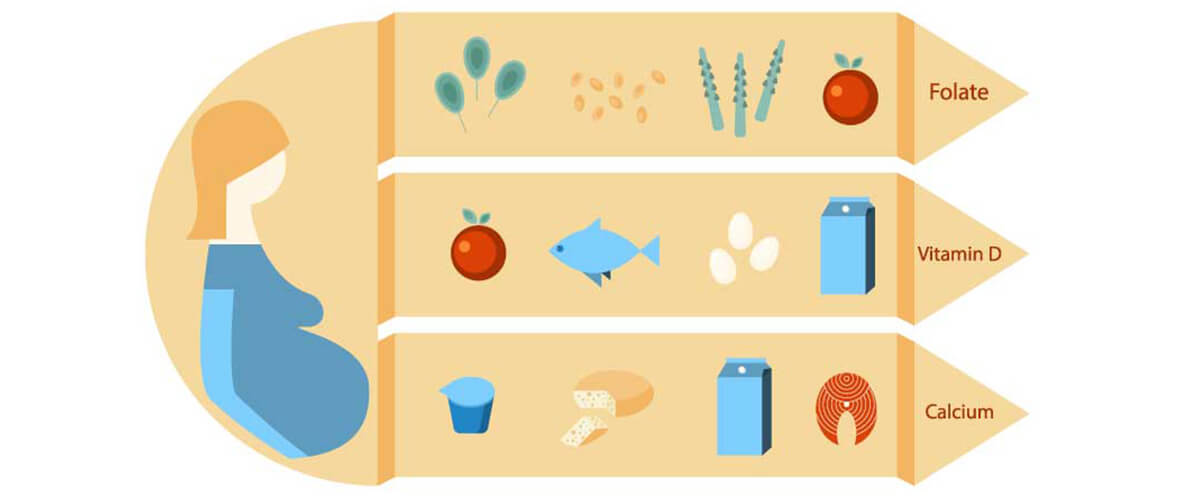A balanced nutritious diet is the best way to receive the necessary vitamins and nutrients you need for pregnancy, but vitamin supplements can also be beneficial. Prenatal vitamin supplements are recommended plus any additional vitamins or minerals if your doctor finds any deficiencies. Remember, supplements do not replace a healthy diet, but rather ensure that a woman is receiving enough daily nutrients. And it’s important to note that pregnant women should take vitamin supplements only with a health care provider’s direct recommendation.
Pregnancy Vitamins and Nutrients
According to the American Congress of Obstetricians and Gynecologists (ACOG), a woman’s intake of nutrients and vitamins during pregnancy should come from a variety of foods, including:
- Proteins
- Carbohydrates
- Vitamins
- Minerals
- Fats
It is important to remember that with a healthy diet, you should be able to get the full amount of these vitamins and minerals. Talk with your healthcare provider about additional supplements to ensure that (1) you are getting enough of each vitamin/mineral, and (2) you are not exceeding the daily maximum for each vitamin/mineral, to avoid overdose/toxicity.
Since a healthy diet should provide most if not all of these vitamins and minerals, you likely will not need to take a prenatal supplement that contains 100% of the recommended daily allowance (RDA) listed below in the table.
| Essential Vitamin/Mineral: | Why You Need It: | Where You Find It: |
| Vitamin A & Beta Carotene (770 mcg, daily max = 1000 mcg) |
Helps bones and teeth grow | Liver, milk, eggs, carrots, spinach, green and yellow vegetables, broccoli, potatoes, pumpkin, yellow fruits, cantaloupe |
| Vitamin D (5 mcg/600 IU, daily max = 4000 IU) | Helps body use calcium and phosphorus; promotes strong teeth and bones |
Milk, fatty fish, sunshine |
| Vitamin E (15 mg, daily max = 1000 mg) | Helps body form and use red blood cells and muscles | Vegetable oil, wheat germ, nuts, spinach, fortified cereals |
| Vitamin C (80 – 85 mg*, daily max = 2000 mg) | An antioxidant that protects tissues from damage and helps body absorb iron; builds a healthy immune system |
Citrus fruits, bell peppers, green beans, strawberries, papaya, potatoes, broccoli, tomatoes |
| Thiamin/B1 (1.4 mg) | Raises energy level and regulates the nervous system | Whole grain, fortified cereals, wheat germ, organ meats, eggs, rice, pasta, berries, nuts, legumes, pork |
| Riboflavin/B2 (1.4 mg) | Maintains energy, good eyesight, healthy skin | Meats, poultry, fish, dairy products, fortified cereals, eggs |
| Niacin/B3 (18 mg, daily max = 35 mg) | Promotes healthy skin, nerves, and digestion | High-protein foods, fortified cereals, and bread, meats, fish, milk, eggs, peanuts |
| Pyridoxine/B6 (1.9 mg, daily max = 100 mg) | Helps form red blood cells; helps to reduce morning sickness | Chicken, fish, liver, pork, eggs, soybeans, carrots, cabbage, cantaloupe, peas, spinach, wheat germ, sunflower seeds, bananas, beans, broccoli, brown rice, oats, bran, peanuts, walnuts |
| Vitamin B12 (2.6 mcg) | An important factor in DNA synthesis, and may help prevent neural tube defects (NTDs) | Shellfish, fish, beef, liver, pork, eggs, dairy, poultry |
| Folic Acid/Folate (400 – 800 mcg†, daily max = 1000 mcg) | Helps support the placenta and prevents spina bifida and other NTDs | Oranges, orange juice, strawberries, green leafy vegetables, spinach, beets, broccoli, cauliflower, fortified cereals, peas, pasta, beans, nuts |
| Calcium (1,000 – 1,300 mg‡) | Creates healthy bones and teeth, helps prevent blood clots, helps muscles and nerves function | Yogurt, milk, cheddar cheese, calcium-fortified foods like soy milk, juices, bread, cereals, dark green leafy vegetables, canned fish with bones |
| Iron (27 mg) | Helps in the production of hemoglobin; prevents anemia, low birth weight, and premature delivery | Beef, pork, dried beans, spinach, dried fruits, wheat germ, oatmeal or grains fortified with iron |
| Protein (71 g) | Helps in the production of amino acids; repairs cells | Most animal foods, meat, poultry, eggs, dairy products, veggie burgers, beans, legumes, nuts |
| Zinc (11 – 13 mg**) | Helps produce insulin and enzymes | Red meats, poultry, beans, nuts, whole grains, fortified cereals, oysters, dairy products |
* Vitamin C: for pregnant women under 18 years of age, 80 mg is suggested; for those above 18 years, 85 mg is recommended.
† Folic Acid/Folate: any level between 400 and 800 micrograms/mcg (or 0.4 and 0.8 milligrams/mg) is typically safe for pregnancy; check with your healthcare provider to find what level is right for you.
‡ Calcium: for pregnant women in their teen years, 1300 mg is suggested; for those age 20 and above, 1000 mg is suggested.
** Zinc: for pregnant women under 18 years of age, 13 mg is suggested; for those above 18 years, 11 mg is suggested.
If you have any dietary restrictions or concerns that you may not be getting enough of certain vitamins or minerals, talk to your healthcare provider and/or nutritionist about supplementation options or dietary recommendations.
Want to Know More?
- Prenatal Vitamin Ingredients
- Pregnancy Nutrition
- Vitamin D and Pregnancy
- Natural Sources of Vitamin B6 During Pregnancy
Compiled using information from the following sources:
1. David G. Mottershead, et. al. Cumulin, an oocyte-secreted heterodimer of the transforming growth factor-beta family, is a potent activator of granulosa cells and improves oocyte quality. Journal of Biological Chemistry. 25 September 2015. doi: 10.1074/jbc.M115.671487
2. Your Pregnancy and Birth, Month to Month, Fifth Ed. The American College of Obstetricians and Gynecologists, Ch. 13.
3. Institute of Medicine of the National Academies
4. Mayo Clinic: Drugs and Supplements: Vitamin B12
5. Oregon State University – Linus Pauling Institute: Vitamin B12
6. Vitamin D Supplementation during Pregnancy: Double-Blind, Randomized Clinical Trial of Safety and Effectiveness. J Bone Miner Res. 26 October 2011. doi: 10.1002/jbmr.463
7. Centers for Disease Control and Prevention (CDC): Folic Acid Recommendations






